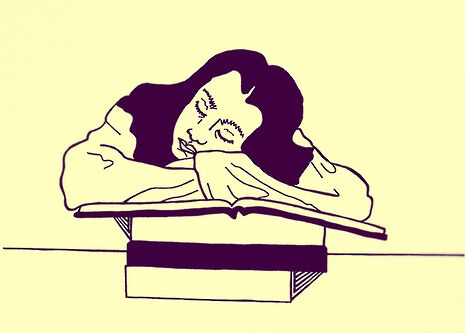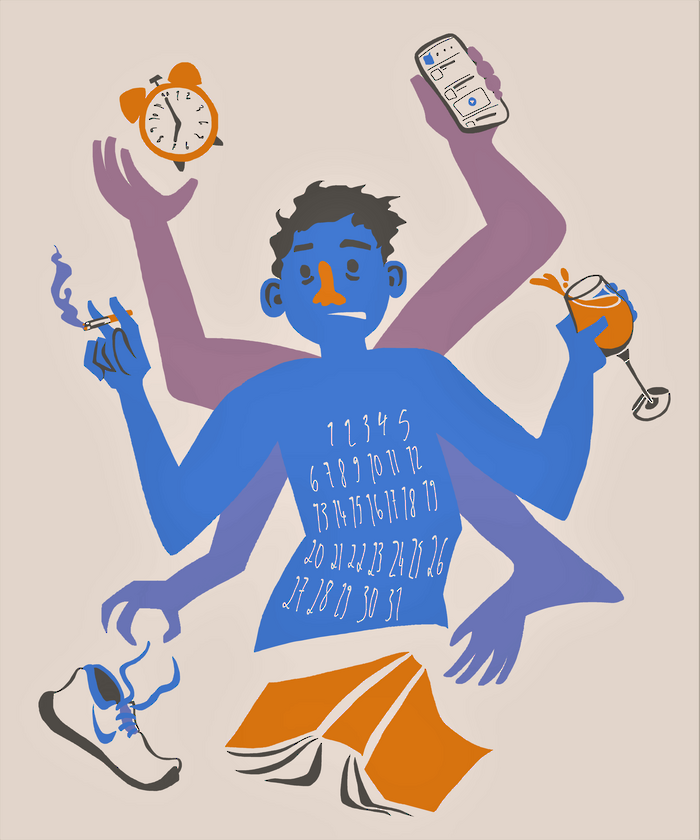The true cost of lost sleep
With late nights and early mornings all too common in Cambridge, George Milner warns of the damage that sleep deprivation inflicts on memory and learning

Sleep plays a crucial role in our ability to form memories. Yet its importance both prior to and following learning is frequently overlooked, especially in the context of looming exams and deadlines.
Sleep can be divided into two stages: REM and NREM sleep. REM sleep, named in reference to the presence of rapid eye movements during it, makes up about a quarter of sleep in adults. The remainder of sleep is categorised as Non-REM or NREM sleep. This can be further divided into stages 1-3 of which stage 1 is seen as a link between sleep and wake, phase 2 is the first stage of true sleep and stage 3 is known as deep or slow wave sleep (SWS). During the night the brain moves between these phases in roughly five ninety-minute cycles Brain imaging techniques such as electroencephalography (EEG) can discriminate non-invasively between different sleep phases in experimental subjects. Fluctuations in the net activity of many neurones in the same orientation produce ‘brain waves’ characteristic of different sleep phases that are detected by electrodes placed on the scalp. This ability to closely monitor brain activity during sleep has contributed significantly towards understanding the function of different stages of sleep and their distribution throughout the night.
A large body of evidence now links sleep with the three stages of memory formation: encoding, consolidation and recall. Sleep is particularly involved in the process of consolidation which not only cements new pieces of information in long-term memory, but also enhances the strength of those memories. Memories themselves can be described as declarative, relating to facts, and procedural, relating to actions such as throwing a ball. For memorising facts, an area of the brain called the hippocampus is of critical importance and it is thought that declarative memories are processed here. During sleep, however, short term memories are transferred from the hippocampus to a region on the outside surface of the brain called the neocortex. This transfer is not absolute, however, and the hippocampus can still play a role in storing memories made months or years previously. In contrast, procedural memory is thought to be less dependent on the hippocampus.
"Sleep-deprived individuals show a 40% decrease in recall"
British neuroscientist Matthew Walker, who rose to popular fame with his book ‘Why we sleep’, demonstrated a link between stage 2 NREM sleep and learning capacity. This was accomplished by investigating learning and recall in one group that was allowed to sleep for two hours after a learning task and in another group that spent the same time spent awake. The results showed a 20% difference in recall ability in favour of those who had slept.
Of particular interest in learning are sleep spindles. These higher frequency brainwave oscillations are a feature of NREM sleep that last only a few seconds with each occurrence and juxtapose the slow, synchronous oscillations of neuronal activity otherwise shown in deep sleep. The number of sleep spindles, measured using an EEG, is correlated with levels of memory consolidation. Two hours of sleep which included a NREM phase was enough to improve the performance of study participants in simple memory tasks. To complicate matters, in everyday life a greater percentage of time is spent in NREM sleep later in the night. This distribution results in an exaggerated loss of sleep spindles and hence impaired memory consolidation even with only modest sleep deprivation. With 40% of adults obtaining less than six hours sleep per night on average, this is an all too common occurrence in the UK.
In contrast, there is evidence that procedural memory is more heavily consolidated by REM sleep. Nevertheless, the contributions of NREM sleep and sleep spindles towards motor learning are also strong, adding further incentive to top up a night’s sleep from six to eight hours. To make matters worse, even a moderately tired brain is also significantly poorer at encoding short-term memories in addition to consolidating them as long-term memories.
Increase sleep deprivation to thirty-six hours leading up to a learning task and the effects on declarative memory are stark. Even when sleep-deprived individuals were allowed two nights of recovery sleep before their recall was tested, a study reported that they showed a 40% decrease in recall from the learning task relative to those who were well-rested throughout.
"Anxiety created by exams serves to damage student sleep cycles"
Yet not only those who miss the occasional full night's sleep are impacted. Walker argues convincingly that it is the summative effects of less extreme yet chronic sleep deprivation that are ‘most worrying from a societal perspective’. It has been shown that ten nights of six hours sleep per night reduced simple reaction times by the equivalent of a full night of deprivation. This impairment went largely unnoticed by subjects. The adage of ‘you don’t recover from illness at university, you just learn to accept a new lower standard of health’ now gains greater meaning. Lack of awareness of cognitive impairment in sleep deprived individuals removes immediate feedback on sleep decisions and encourages the belief that an individual is getting away with cutting down on sleep when the truth is altogether different.
The synergy between sleep and learning is particularly prone to breakdown in the lead up to exams. Working late into the night, many students are undoing much of the hard work, both past and future, that they avoid sleep for to carry out in the first place. On the other hand, poor sleeping habits are not simply the function of individual tendencies. University life, with closely crammed final exams, in itself fails to facilitate appropriate patterns of sleep. Added anxiety created by these also serves to damage student sleep cycles. The strong links between sleep and both mental and physical health, make sleep deprivation not only counterproductive to learning but also directly damaging to individuals.
It would be inappropriate to blame faculties for all student behaviour, however. Sleeping in later or continuing to sleep for appropriate periods despite mounting priorities are still culturally associated with laziness and unproductivity. Sleep deprivation should not be seen as a necessary part of hard work and commitment. It is a sad irony that in exam season, when students have much to gain from appropriate sleep, many take deprivation to greater extremes.
 News / CUP announces funding scheme for under-represented academics19 December 2025
News / CUP announces funding scheme for under-represented academics19 December 2025 News / Cambridge welcomes UK rejoining the Erasmus scheme20 December 2025
News / Cambridge welcomes UK rejoining the Erasmus scheme20 December 2025 News / SU reluctantly registers controversial women’s soc18 December 2025
News / SU reluctantly registers controversial women’s soc18 December 2025 Film & TV / Timothée Chalamet and the era-fication of film marketing21 December 2025
Film & TV / Timothée Chalamet and the era-fication of film marketing21 December 2025 News / News in Brief: humanoid chatbots, holiday specials, and harmonious scholarships21 December 2025
News / News in Brief: humanoid chatbots, holiday specials, and harmonious scholarships21 December 2025









